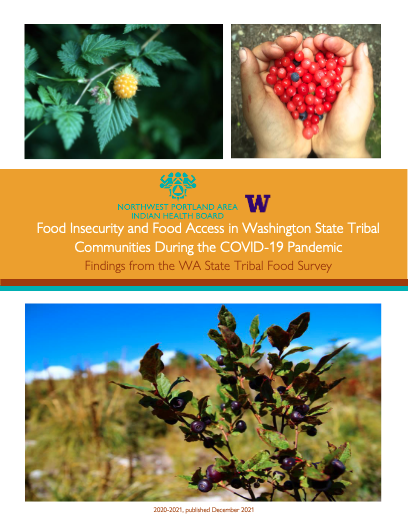Survey of Washington state tribal communities illustrates how pandemic has exacerbated food disparities
Project finds barriers to traditional foods access and major disparities in food insecurity among Washington state tribal communities during the COVID-19 pandemic
A recent survey of American Indian/Alaska Native (AI/AN) individuals sheds further light on the disparate impacts of the COVID-19 pandemic among Washington State tribal communities. The project, the WA Tribal Food Survey (WATRIBAL), is a collaborative effort between researchers from the Northwest Tribal Epidemiology Center (NWTEC), an organization within the Northwest Portland Area Indian Health Board (NPAIHB), the University of Washington School of Public Health, and Tacoma Community College, and focuses on food security, wellbeing, and access to traditional foods experienced by AI/AN Washingtonians in the midst of COVID-19.
“Barriers to accessing fresh, healthy, nutritious, and traditional foods are rooted in colonization and the removal of tribal people from their homelands, often to areas that are less rich in natural resources. Federal policies throughout history have affected the way native people interact with the food system. Continued tribal food sovereignty efforts, engagement with traditional food knowledge, and investment in local and regional tribal food systems is vital to improving the access and availability to these foods.”
– Dr. Victoria Warren-Mears, Director, NWTEC
The study team met with tribal representatives from across the state and incorporated their feedback into a survey, which ran from March to April 2021 and received responses from 196 WA residents identifying as a member or descendent of a tribe. 67% of responding households were found to be food insecure, and use of food assistance was found to have doubled among respondents since before the onset of the pandemic. Use of and access to traditional foods was found to have decreased substantially among those surveyed, top reasons being named as COVID-19 restrictions and pandemic-related disruptions to channels of traditional food procurement and distribution.
WATRIBAL respondents reported faith in the leadership of tribal officials, elders, clinicians, and community organizations responding to COVID-19. Some already had access to traditional foods programs, and there was great interest in having traditional foods programming among those who did not have access. When survey participants were asked about any potential positive outcomes of the pandemic, community members helping one another to grow and access food was the top response.
“The results from WATRIBAL illustrate how the pandemic has exacerbated existing economic and food disparities among the AI/AN population in WA state. Though there have been examples of positive outcomes, there is still a great deal of work to do in the continued efforts to respond to COVID impacts and ensure further resiliency in the future. The full report outlines actionable next steps that state, federal, and tribal leaders can do to further the work of food security and food sovereignty for WA State tribes.”
– Nora Frank-Buckner, Food Sovereignty Initiatives Director, NPAIHB
These findings showcase disproportionate hardship and major barriers to accessing traditional foods among many AI/AN households in Washington, but also longstanding resilience and strength in the face of historical and present inequity. Researchers involved believe results of this study will help to inform the ongoing responses of tribal governments and community organizations working to ensure the wellbeing of those they serve. The study team also hopes that their project will pave the way for further research in service of tribal communities, and contribute to a larger body of work dedicated to supporting and uplifting the traditional food access, food resiliency, and food sovereignty efforts and rights of AI/AN people everywhere.
“Carrying out collaborative work in service of Washington’s tribal communities has felt incredibly important, both in terms of helping to address immediate need brought about by the pandemic, and also in the interest of engaging in reparative and actionable research. The opportunity to thoughtfully forge relationships amongst the researchers and organizations involved in this project has been invaluable. I’m thrilled that our team will be jumping into more joint work with these partners in the near future.”
– Dr. Jennifer Otten, Food Systems Director and Associate Professor, UW School of Public Health
Read the Report
Related
- Pandemic disrupts food access for tribal communities, UW DEOHS Blog, January 24
- Survey shows disproportionate food insecurities in Washington tribal communities, UW Population Health, January 20
December 7, 2021
